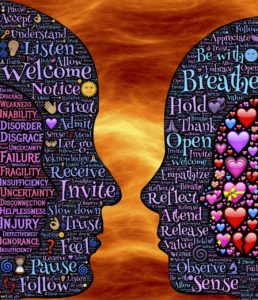My family of origin. It’s been broken for a while. And now somebody is ill. Time to pick up the pieces. Time to show  some compassion. But how? What to do?
some compassion. But how? What to do?
First you gotta put the past behind you, and concentrate on the now. Woulda, coulda, shoulda doesn’t help right now. It’s not going to get fixed at this late date under these conditions, but if you reach out and build that bridge with compassion, it will get better.
Take it slow. If you can. As an empath or highly sensitive person, we feel everything. Conflicting emotions can be difficult and overwhelming. And exhausting. Step in, but take time to step out and rest. Don’t expect clarity at every moment. Do the best you can, and some days the best you can will be different than on other days.
Have a support system, but don’t tell everyone you know. We need to be able to confide in and process with a few trusted confidantes who won’t judge us. We want advice and suggestions, not judgment. We are already judging ourselves over years of family troubles, we don’t need any more.
Don’t get stuck. Forget how did it get this way. It did. Period. Time to accept and move on. And step in. Don’t wait to get dragged in. Stepping is easier than dragging, and it gives you more autonomy.
Do you have another family member who you can be brutally honest with? It is helpful to validate our feelings and thoughts with someone who shares our family history. Work through the mess together. Work through what needs to be done together. Pray and hold each other’s hand together.
Keep some boundaries. You have created a life outside of your family or origin. Keep it. Protect it. Do what you can, but don’t sacrifice what you have made.
Time shifts when someone is seriously ill, and you realize that you don’t have the luxury of figuring things out because you don’t have the luxury of time. We can use our time to move toward forgiveness. The ill person may be grateful that you are just showing up – and gratitude melts anger.
My family member doesn’t have good days anymore. No good days and bad days. There are bad days with good moments and bad moments. And my heart breaks for her and breaks for the family I thought I had many years ago before it shattered. So I remind myself that I am doing the best I can in this moment …. and so is she.

 “Come in she said, I’ll give ya shelter from the storm.” (Bob Dylan) Shelter from the storm embraces those in need. Those hurting. Those battered by life or by circumstance. The broken hearted. The broken spirited. Shelter from the storm is a warm embrace, a kind word, a holding hand, a nod of understanding. It is providing empathy for the breaking and the broken.
“Come in she said, I’ll give ya shelter from the storm.” (Bob Dylan) Shelter from the storm embraces those in need. Those hurting. Those battered by life or by circumstance. The broken hearted. The broken spirited. Shelter from the storm is a warm embrace, a kind word, a holding hand, a nod of understanding. It is providing empathy for the breaking and the broken. People say that you learn a lot from your old dog. Now I am one of those people. My dog is entering the twilight of his life with grace, and I’m trying to enter it with grace too. He still greets each day happy just to be here, and I am reminded (because of him) that each day is a gift. So make the most of it.
People say that you learn a lot from your old dog. Now I am one of those people. My dog is entering the twilight of his life with grace, and I’m trying to enter it with grace too. He still greets each day happy just to be here, and I am reminded (because of him) that each day is a gift. So make the most of it. I survived this. The unimaginable. I will show you. I will tell you. If I could bear it, can you bear the telling of it? It was bad. And people need to know. Someone needs to know. What happened to me. How helpless we were. What happened to us. I will tell you. ~
I survived this. The unimaginable. I will show you. I will tell you. If I could bear it, can you bear the telling of it? It was bad. And people need to know. Someone needs to know. What happened to me. How helpless we were. What happened to us. I will tell you. ~ A child teaches us that we can always make a difference:
A child teaches us that we can always make a difference: Have you ever seen the old B & W movie, It’s a Wonderful Life? Although it is 50+ years old, the message still rings true today. You never know how many lives you touch. Your words and actions can have a profound effect on others’ lives in a way that you have never imagined. You are changing the world every day just by being here and just by being you.
Have you ever seen the old B & W movie, It’s a Wonderful Life? Although it is 50+ years old, the message still rings true today. You never know how many lives you touch. Your words and actions can have a profound effect on others’ lives in a way that you have never imagined. You are changing the world every day just by being here and just by being you. An empath can look into your eyes and see your heart. If “The eyes are the windows to the soul,” (Shakespeare), then I would add that the heart is the soul’s keeper. To us, the soul is the seat of our deepest and truest part and where our emotional self lives. Empaths have this second sight of seeing in through this window. We are let in without even trying. We just know. It is a trait and a blessing that we must handle with care and compassion.
An empath can look into your eyes and see your heart. If “The eyes are the windows to the soul,” (Shakespeare), then I would add that the heart is the soul’s keeper. To us, the soul is the seat of our deepest and truest part and where our emotional self lives. Empaths have this second sight of seeing in through this window. We are let in without even trying. We just know. It is a trait and a blessing that we must handle with care and compassion.